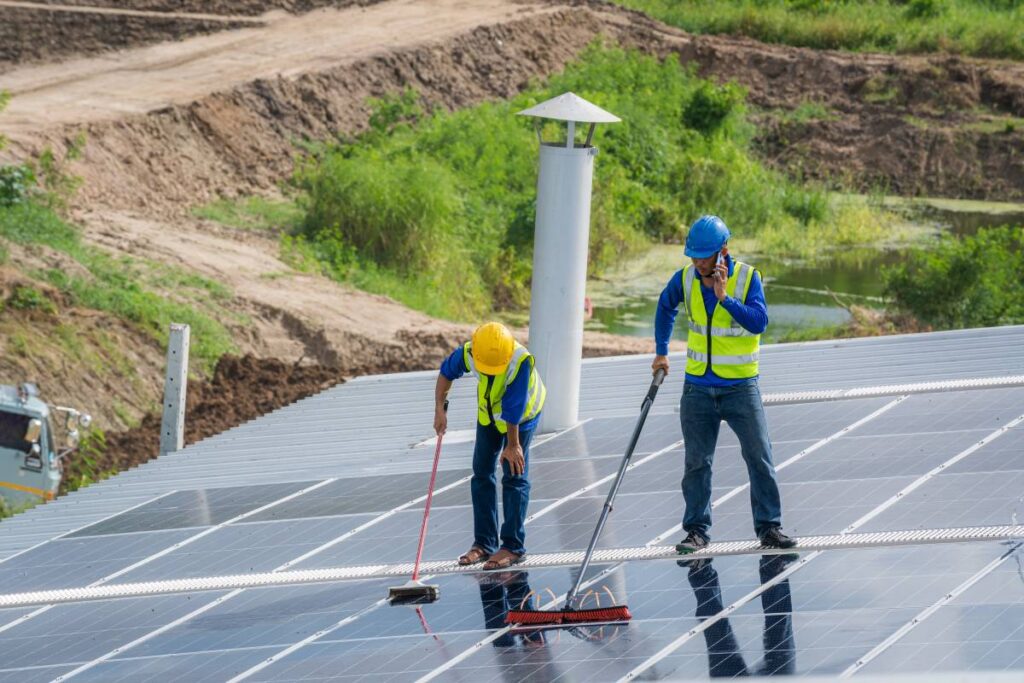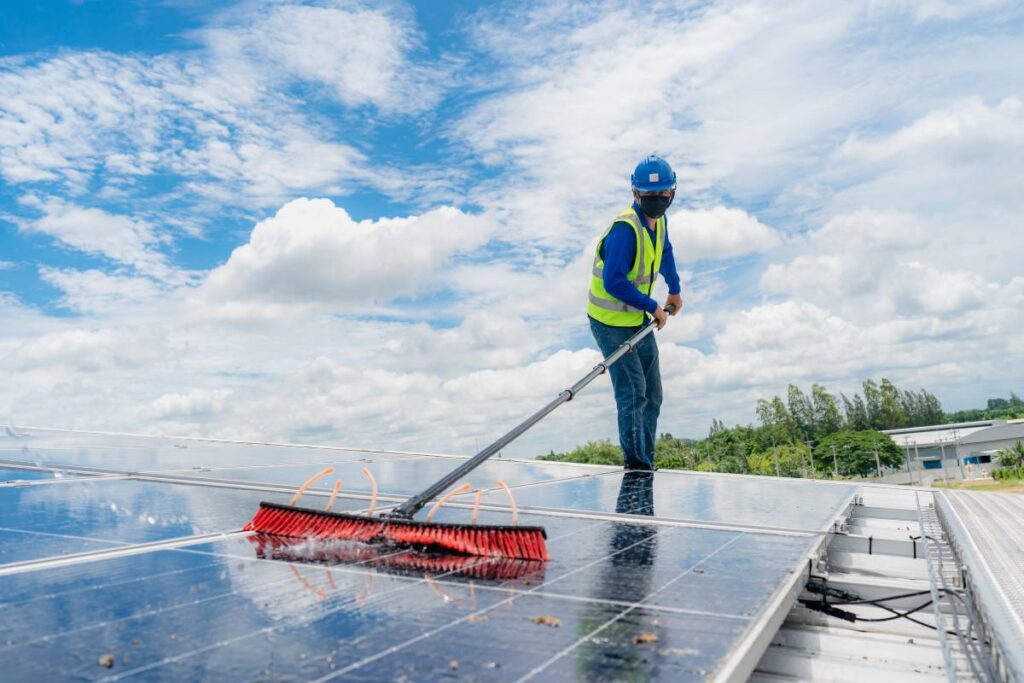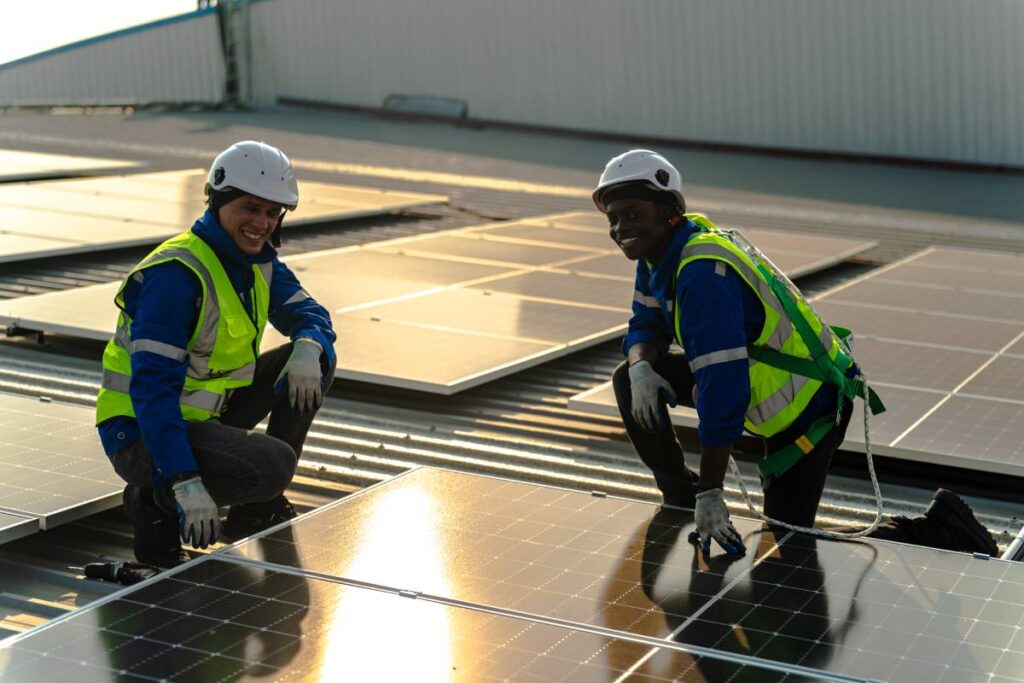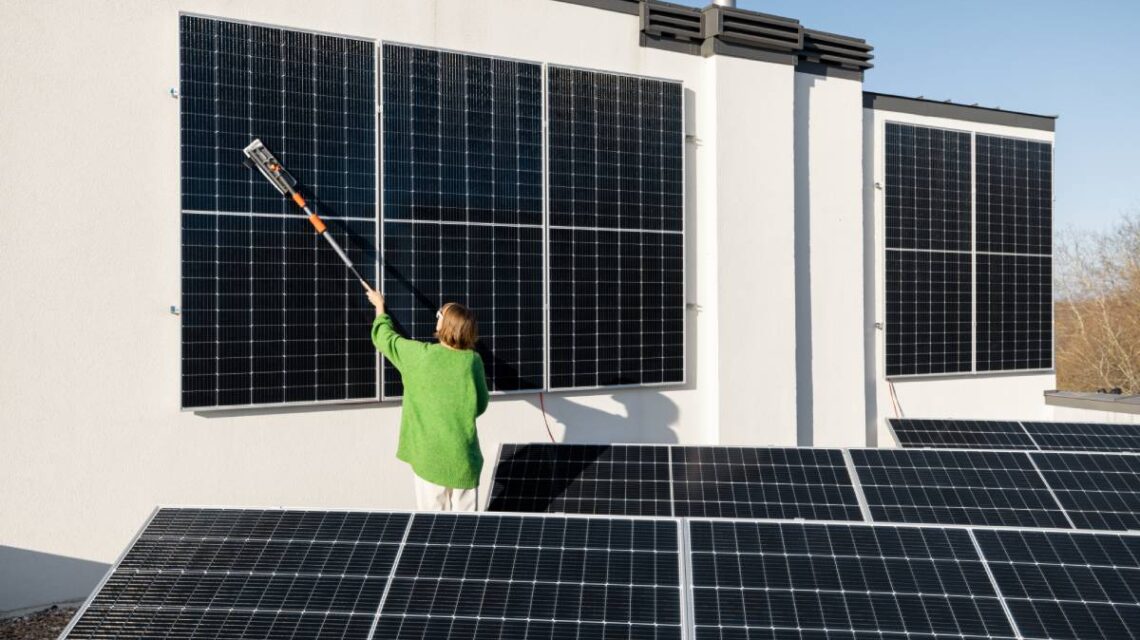Solar panels are an increasingly popular choice for renewable energy generation, offering clean and sustainable power for homes and businesses. However, to ensure optimal performance and longevity, regular cleaning is essential.
In this guide, we’ll explore the best practices for cleaning solar panels, including how often to clean them, the most effective cleaning methods, and what to avoid to prevent damage.
Related article:
- Is Schneider Electric a good brand? What are they known for? Is ABB the same as Schneider? Which is better?
How often should you clean your solar panels?
Ensuring your solar panels stay clean is crucial for maintaining their efficiency. Dirty panels can lose up to 20% of their energy output, according to The Solar Energy Power Association. But how often should you clean them? While there’s no one-size-fits-all answer, cleaning them at least twice a year is generally recommended. However, several factors can influence this frequency.
Firstly, consider your location and the prevailing weather conditions. If you live in an area with frequent rain or strong winds, nature might take care of some cleaning for you. In such areas, you may need to clean your solar panels less often, perhaps every six months to a year.
However, if you reside in a dusty or dry region, or if your panels are prone to bird droppings or tree debris, you’ll likely need to clean them more frequently. In these cases, a cleaning schedule of every three to six months is advisable.

Next, assess the tilt angle of your solar panels. Panels installed at a steeper tilt tend to shed dirt and debris more effectively when it rains. If your panels are installed at a shallow angle or if they’re flat on the roof, they may accumulate more dirt and require more frequent cleaning.
Another factor to consider is the efficiency loss due to dirt buildup. Studies have shown that dirty solar panels can experience a decrease in energy production by up to 25%. Regular cleaning can help mitigate this loss and ensure your panels operate at peak performance.
Furthermore, keep an eye on your energy output. If you notice a significant decrease in energy generation compared to previous months, it might be time to schedule a cleaning.
Now, let’s talk about the cleaning process itself. It’s crucial to use the right tools and techniques to avoid damaging your panels.
Start by checking the manufacturer’s guidelines for cleaning instructions. Some panels may require specific cleaning products or methods to maintain their warranty.
When cleaning your solar panels, use a soft brush or sponge and a gentle, non-abrasive cleanser diluted in water. Avoid using harsh chemicals or abrasive materials that could scratch the glass surface of the panels.
If your panels are easily accessible from the ground, you can clean them using a hose with a gentle spray attachment. Alternatively, you can hire a professional solar panel cleaning service to ensure thorough and safe cleaning, especially for panels installed on rooftops.
Remember to clean your panels early in the morning or late in the evening when they’re cool to avoid thermal shock, which could damage the glass.
What is the best way to clean your solar panels?
Cleaning your solar panels is crucial for maintaining their efficiency and maximizing energy production. But what’s the best way to clean them? Let’s break it down into simple steps.

- Safety First: Before you start cleaning, ensure your safety. If your solar panels are installed on the roof, use a sturdy ladder and take necessary precautions to prevent accidents.
- Check the Weather: Ideally, clean your solar panels on a cool, cloudy day or early in the morning or late in the evening when the panels are not hot. Cleaning them in direct sunlight can cause the water to evaporate quickly, leaving behind streaks.
- Gather Your Tools: You’ll need a few basic tools for cleaning your solar panels:
- Soft brush or sponge: Opt for a brush with non-abrasive bristles to avoid scratching the glass surface of the panels.
- Mild detergent or soap: Use a gentle, non-abrasive cleanser diluted in water to remove dirt and grime.
- Hose with a gentle spray attachment: This will help rinse off the soap and dirt without applying too much pressure.
- Start Cleaning: Here’s a step-by-step guide to cleaning your solar panels:
- Rinse: Begin by rinsing the panels with water to remove loose dirt and debris. Use a gentle spray setting on your hose to avoid applying too much pressure.
- Soap: Mix a small amount of mild detergent or soap with water in a bucket. Dip the soft brush or sponge into the soapy water and gently scrub the surface of the panels to remove stubborn dirt and bird droppings. Avoid using abrasive cleaners or brushes that could scratch the glass.
- Rinse Again: Once you’ve scrubbed the panels, rinse them thoroughly with clean water to remove any soap residue.
- Dry: Allow the panels to air dry naturally. Avoid using towels or cloths to dry them, as these may leave behind lint or streaks.
- Consider Using a Hose Extension or Sprinkler: If your solar panels are difficult to reach, consider using a hose extension or a sprinkler system to clean them from the ground. There are also specialized solar panel cleaning kits available that attach to your hose for added reach and convenience.
- Professional Cleaning: If you’re not comfortable cleaning your solar panels yourself or if they’re installed in a hard-to-reach location, consider hiring a professional solar panel cleaning service. These professionals have the experience and equipment to safely and effectively clean your panels without causing damage.
- Regular Maintenance: Make cleaning your solar panels a part of your regular maintenance routine. Depending on your location and weather conditions, aim to clean your panels every three to six months to ensure optimal performance.

What should you not do when cleaning solar panels?
Cleaning your solar panels is essential for maintaining their efficiency and maximizing energy production. However, there are certain things you should avoid doing to prevent damage to your panels. Let’s explore what you should not do when cleaning solar panels:
- Do Not Use Abrasive Materials: Avoid using abrasive materials such as steel wool, abrasive sponges, or brushes with stiff bristles. These can scratch the glass surface of the panels, leading to permanent damage and reduced efficiency.
- Do Not Use Harsh Chemicals: Refrain from using harsh chemicals, solvents, or strong detergents to clean your solar panels. These chemicals can react with the panel’s materials and coatings, causing damage and reducing their lifespan. Stick to mild, non-abrasive cleansers diluted in water.
- Do Not Clean Panels When Hot: Avoid cleaning your solar panels when they are hot, such as during the peak of the day. Cleaning them in direct sunlight can cause the water to evaporate quickly, leaving behind streaks and residue. Instead, clean them early in the morning or late in the evening when they are cool.
- Do Not Use High-Pressure Water: Refrain from using high-pressure water or power washers to clean your solar panels. High-pressure water can damage the panels’ delicate components, such as seals and junction boxes, leading to leaks and electrical issues. Stick to a gentle spray setting on your hose to avoid applying too much pressure.
- Do Not Stand on the Panels: Avoid standing or walking on the solar panels, as this can cause them to crack or break. Instead, use a sturdy ladder or hire a professional if your panels are installed on the roof and are difficult to reach.
- Do Not Ignore Safety Precautions: Always prioritize safety when cleaning your solar panels. Use a sturdy ladder and take necessary precautions to prevent accidents, especially if your panels are installed on the roof. If you’re not comfortable with heights or if the panels are in a hard-to-reach location, consider hiring a professional cleaning service.
- Do Not Skip Regular Cleaning: Avoid neglecting regular cleaning maintenance for your solar panels. Over time, dirt, dust, bird droppings, and other debris can accumulate on the panels’ surface, reducing their efficiency. Aim to clean your panels every three to six months, depending on your location and weather conditions.
- Do Not Use Excessive Force: When cleaning your solar panels, avoid applying excessive force or pressure, especially when scrubbing. Gentle, consistent pressure is sufficient to remove dirt and grime without risking damage to the panels.
- Do Not Forget to Check Manufacturer Guidelines: Finally, do not forget to check the manufacturer’s guidelines for cleaning instructions specific to your solar panels. Some panels may have specific recommendations or restrictions on cleaning products and methods to maintain their warranty.
In conclusion
Proper maintenance and cleaning are vital for maximizing the efficiency and lifespan of your solar panels. By adhering to a regular cleaning schedule, using gentle cleaning methods, and avoiding common pitfalls such as abrasive materials and harsh chemicals, you can ensure that your solar panels continue to generate clean and sustainable energy for years to come. Whether you choose to clean them yourself or hire a professional service, investing in the upkeep of your solar panels is an investment in the future of renewable energy and a cleaner environment for generations to come.



